10 of the Best Poems of Dorothy Parker
Are you looking for some of the best poems of Dorothy Parker? You’re, indeed, at the right place. In this post, we’re going to feature Dorothy Parker’s best poetry, ranked according to its popularity, depth, and lyricism. Parker was one of the popular satirists of 20th-century American literature. She was on one hand an incredible poet, and, on the other hand, a great short story writer. Parker’s first poem was published in Vanity Fair magazine in 1914. Her poetic career took off with the publication of Enough Rope (1926), which sold 47,000 copies.
Parker wrote deep, witty verses marked by her clever style and deeply touching emotions. Some critics praised her “salty humor” and authenticity. Others dismissed her work as “light” or “flapper” verse. However, we think Parker introduced a new taste to American readers, evident in her most famous poems mentioned here.
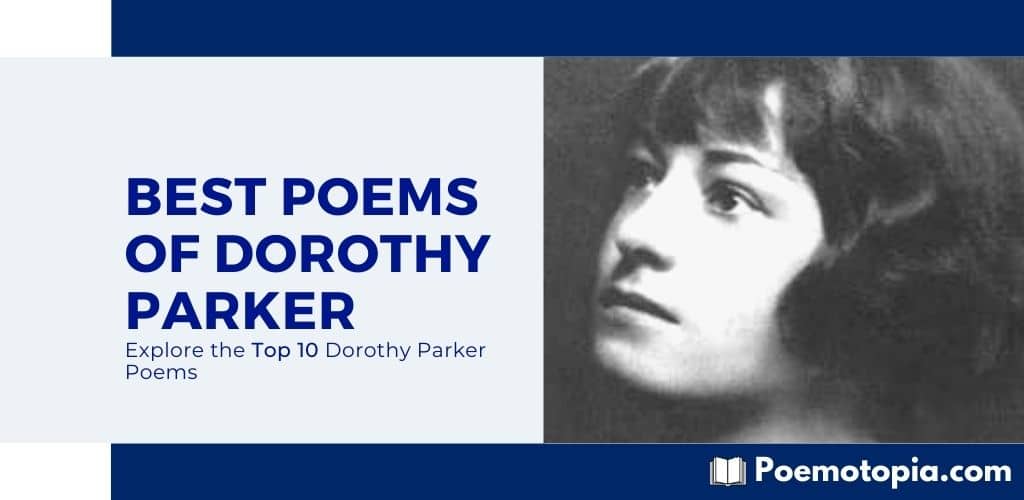
#10 Resumé
First appeared in New York World on 16 August 1925, and later included in Enough Rope (1926), Dorothy Parker’s “Resumé” is about a speaker’s hesitations to commit suicide for the associated pain that has to be endured. For instance, the speaker says razors pain oneself, and the rivers are too damp to drown oneself. Explore the full poem below:
Razors pain you;
Rivers are damp;
Acids stain you;
And drugs cause cramp.
Guns aren’t lawful;
Nooses give;
Gas smells awful;
You might as well live.
Listen to Dorothy Parker reading the poem:
#9 But Not Forgotten
One of the best poems of Dorothy Parker, “But Not Forgotten” was first published in her second poetry collection, Sunset Gun (1928). It was written in the same year Parker divorced her husband Edwin Pond Parker. As the title says, this poem is about how the lover cannot forget the speaker even after their separation. This piece begins with a rhyming couplet:
I think, no matter where you stray,
That I shall go with you a way.
Throughout the poem, the speaker tells her lover that even though the relationship has ended, they both cannot forget each other. She especially focuses on her lover’s future without her and keeps her perspective aside. But, readers can guess how she personally feels by reading these lines:
Though you may wander sweeter lands,
You will not soon forget my hands,
Nor yet the way I held my head,
Nor all the tremulous things I said.
You still will see me, small and white
And smiling, in the secret night,
And feel my arms about you when
The day comes fluttering back again.
I think, no matter where you be,
You’ll hold me in your memory
And keep my image, there without me,
By telling later loves about me.
#8 A Certain Lady
Here’s another piece from Enough Rope, on our list of best Dorothy Parker poems. This poem is about one “certain” lady confessing her feelings in the absence of her lover. She smiles for him, tilts her head, and makes a show of her happiness, hiding her pain and tears. Her lover will never know how broken she is. Let’s read some of the memorable lines of this poem:
When you rehearse your list of loves to me,
Oh, I can laugh and marvel, rapturous-eyed.
And you laugh back, nor can you ever see
The thousand little deaths my heart has died.
And you believe, so well I know my part,
That I am gay as morning, light as snow,
And all the straining things within my heart
You’ll never know.
(…)
Thus do you want me – marveling, gay, and true,
Nor do you see my staring eyes of nights.
And when, in search of novelty, you stray,
Oh, I can kiss you blithely as you go ….
And what goes on, my love, while you’re away,
You’ll never know.
#7 A Fairly Sad Tale
“A Fairly Sad Tale” is another of the well-known poems of Dorothy Parker. This autobiographical poem narrates how the poet was and what she desired from a relationship. The speaker wonders by saying, “Why I am thus, and I am so.” Then she goes on to describe how the men she met in her life cared much about themselves without valuing her wishes.
They broke my heart, they stilled my song,
And said they had to run along,
Explaining, so to sop my tears,
First came their parents or careers.
But ever does experience
Deny me wisdom, calm, and sense!
Though she’s a fool who seeks to capture
The twenty-first fine, careless rapture,
I must go on, till ends my rope,
Who from my birth was cursed with hope.
A heart in half is chaste, archaic;
But mine resembles a mosaic-
The thing’s become ridiculous!
Why am I so? Why am I thus?
Do you want to learn more about Parker’s life? Don’t forget to check out Dorothy Parker: In Her Own Words. Editor Barry Day combines her stories, poems, articles, reviews, and even her rare journalism and lyrics to describe her life in this influential book.
Listen to “A Fairly Sad Tale” in Parker’s own voice:
#6 Interior
“Interior” is one of the best poems of Dorothy Parker, consisting of three quatrains with a rhyme scheme of ABAB. In this poem, Parker personifies her “mind” describing it as a solitary being living inside bolted doors, in a tidied-up room:
Her mind lives in a quiet room,
A narrow room, and tall,
With pretty lamps to quench the gloom
And mottoes on the wall.
In the memorable last lines, the speaker describes how her mind stops listening to her broken heart to maintain its orderliness:
Her mind lives tidily, apart
From cold and noise and pain,
And bolts the door against her heart,
Out wailing in the rain.
#5 One Perfect Rose
“One Perfect Rose” is one of Parker’s best-loved poems, written in her 30s. It first appeared in Life in 1923 and was published in her first collection of poetry, Enough Rope. This poem is about a rose sent to the speaker as a token of love.
A single flow’r he sent me, since we met.
All tenderly his messenger he chose;
Deep-hearted, pure, with scented dew still wet –
One perfect rose.
I knew the language of the floweret;
“My fragile leaves,” it said, “his heart enclose.”
Love long has taken for his amulet
One perfect rose.
The witty twist tinged with humor occurs in the last quatrain of the poem, where she says,
Why is it no one ever sent me yet
One perfect limousine, do you suppose?
Ah no, it’s always just my luck to get
One perfect rose.
Listen to Parker reading “One Perfect Rose”:
#4 Symptom Recital
One of the oft-read Dorothy Parker poems, “Symptom Recital” is a sing-song-like piece packed with sarcasm and wit. Most of the lines begin with a capital “I” marking it a personal piece. In this poem, Parker describes herself quite straightforwardly beginning from her disposition to her body. The poem could be titled “Hate Song” due to the speaker’s bitter views on herself. Let’s read this heated, waggish piece:
I do not like my state of mind;
I’m bitter, querulous, unkind.
I hate my legs, I hate my hands,
I do not yearn for lovelier lands.
I dread the dawn’s recurrent light;
I hate to go to bed at night.
I snoot at simple, earnest folk.
I cannot take the gentlest joke.
I find no peace in paint or type.
My world is but a lot of tripe.
I’m disillusioned, empty-breasted.
For what I think, I’d be arrested.
I am not sick, I am not well.
My quondam dreams are shot to hell.
My soul is crushed, my spirit sore;
I do not like me any more.
I cavil, quarrel, grumble, grouse.
I ponder on the narrow house.
I shudder at the thought of men….
I’m due to fall in love again.
#3 General Review of the Sex Situation
Another famous Parker poem, “General Review of the Sex Situation” is a short, sharp-witted piece consisting of four rhyming couplets. Each couplet can be considered as an epigram. This generalized review of the mindset and tastes of both sexes (male and female) reads:
Woman wants monogamy;
Man delights in novelty.
Love is woman’s moon and sun;
Man has other forms of fun.
Woman lives but in her lord;
Count to ten, and man is bored.
With this the gist and sum of it,
What earthly good can come of it?
Do you know Dorothy Parker wrote more than 300 poems in her early career? She collected most of her verses between 1926 and 1933. The remaining 122 once-forgotten poems were collected by Stuart Silverstein and published in Not Much Fun: The Lost Poems of Dorothy Parker (1996).
#2 A Dream Lies Dead
Parker’s best-known poem “A Dream Lies Dead” was published in Sunset Gun (1928). It is written as a Shakespearean sonnet with the line division of a Petrarchan sonnet. The rhyme scheme of this piece is ABBA ABBA CDCD EE. In the first eight lines (or two quatrains), the speaker requests not to mourn the death of her dream. In the next lines, the speaker somewhat reaches a conclusion that one should wisely accept a dream’s unification with “wistful dead.” Read the sonnet below:
A dream lies dead here. May you softly go
Before this place, and turn away your eyes,
Nor seek to know the look of that which dies
Importuning Life for life. Walk not in woe,
But, for a little, let your step be slow.
And, of your mercy, be not sweetly wise
With words of hope and Spring and tenderer skies.
A dream lies dead; and this all mourners know:
Whenever one drifted petal leaves the tree—
Though white of bloom as it had been before
And proudly waitful of fecundity—
One little loveliness can be no more;
And so must Beauty bow her imperfect head
Because a dream has joined the wistful dead!
#1 A Very Short Song
“A Very Short Song” is considered one of Parker’s most famous and oft-quoted poems. It’s a “very short” poem consisting of two quatrains with the ABAB rhyme scheme, but its irony is unmatchable. In this poem, the speaker shares how some unmindful lad broke her heart at a young age. She, too, has broken one heart. The experiences of heartbreaks help her to come to a conclusion,
Love is for unlucky folk,
Love is but a curse.
This poem is popular due to its simplicity, precision, and directness. Explore the full poem below:
Once, when I was young and true,
Someone left me sad-
Broke my brittle heart in two;
And that is very bad.
Love is for unlucky folk,
Love is but a curse.
Once there was a heart I broke;
And that, I think, is worse.
Apart from our pick of top 10 Dorothy Parker poems, her other famous poems include:
- “The Danger of Writing Defiant Verse”
- “Song in a Minor Key”
- “Finis”
- “The Choice”
- “Star Light, Star Bright”
- “Interview”
- “Penelope”
FAQs
One of the most famous poems of Dorothy Parker is “A Very Short Song.” Some of her other best poems include “A Dream Lies Dead,” “General Review of the Sex Situation,” “Symptom Recital,” “One Perfect Rose,” “Interior,” “A Fairly Sad Tale,” etc.
Dorothy Parker mostly wrote conventional lyrics with a set rhyme scheme and meter. Later she wrote several free-verse poems. Her earlier poetry features the themes of heartache, love, longing, and depression. Her mature poems are embedded with irony, sarcasm, and wit.
In her lifetime, Parker published four collections of poetry, including Enough Rope (1926), Sunset Gun (1928), Death and Taxes (1931), Not So Deep as a Well (1936), and Collected Poetry (1944). All the poems published during her lifetime were included in the collection, The Portable Dorothy Parker. During her 20s, she wrote over 300 poems.
Dorothy Parker is best known for her witticism, humorous style, satire, and deeply emotional verses. She is one of the popular poets and short story writers of 20th-century American literature.
Dorothy Parker’s poems are about the power dynamics of gender, follies of society, and relationships.
Useful Resources
- Check out The Portable Dorothy Parker — Devoted admirers of Parker will surely find their favorite poems and stories in this collection. You can also listen to the Selected Readings from The Portable Dorothy.
- Check out Dorothy Parker: What Fresh Hell Is This? — This landmark Dorothy Parker biography traces her life and describes her relationships with the Algonquin Round Table, and attempts to portray her complex personality.
- Biography of Dorothy Parker — Learn about the poet’s life and career.
- Poet Profile of Dorothy Parker — Read more about the poet and her works.

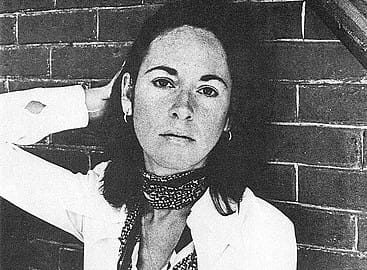
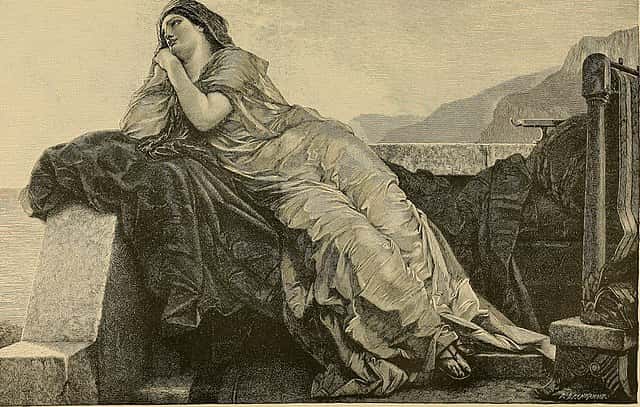
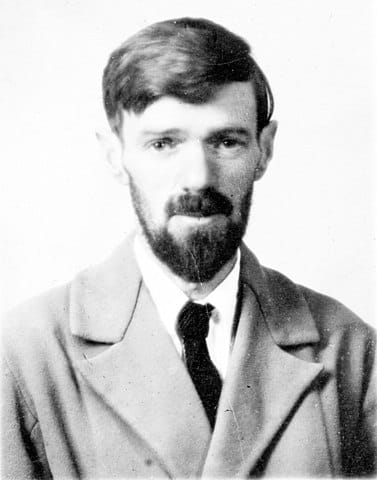

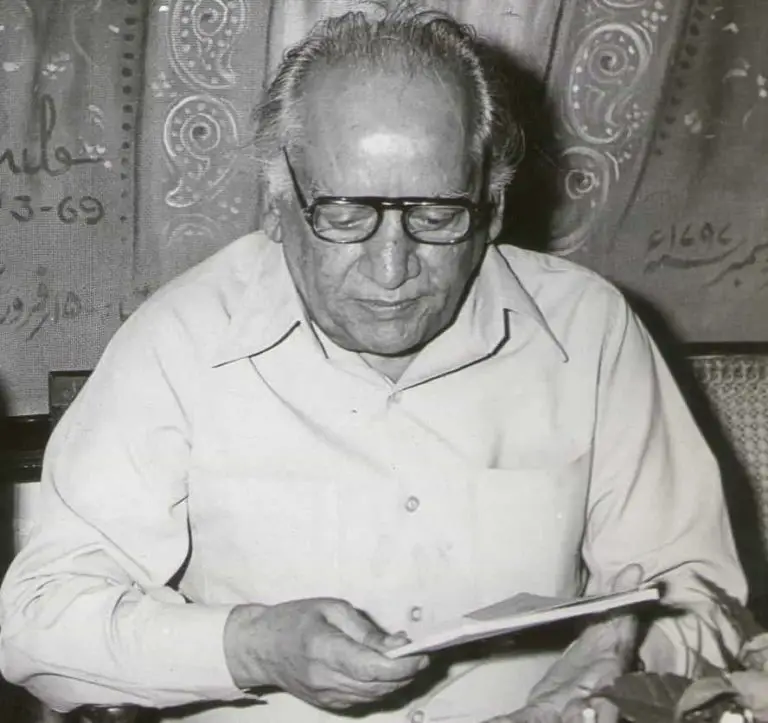
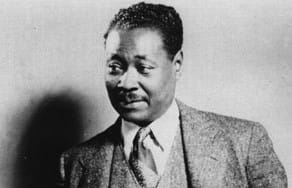
Is this about the best poems of Dorthy Parker? I’ll say it again, is this about the best poems of Dorothy Parker? I think so. I think I have come to the right place to read about the best poems of Dorothy Parker.